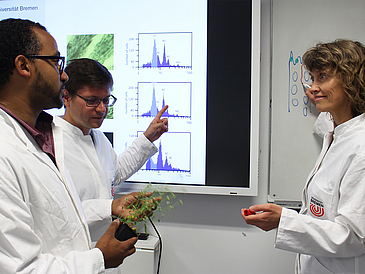The ultimate goal pursued by all living things on our planet is reproduction. In order to secure offspring, it is not unusual for the males of the species to produce huge amounts of sperm cells. While this strategy increases the likelihood of fertilization, it also carries the risk of an egg merging with more than one sperm cell. This process, known as polyspermia, is usually fatal in animals and humans. In the process of reproduction, also plants form ova and sperm cells. In a project supported by the European Research Council (ERC), a working group from the University of Bremen was able to show for the first time that polyspermia is not only present in plants, but that it can also lead to survivable offspring which have three parents: a mother and two fathers. This phenomenon has been somewhat neglected since it is quite rare. However, new research findings were recently published in the English-language magazine “Nature Communications”. Click here to read the English article. The DOI number is: 10.1038 / s41467-017-01044-y
By means of a genetic trick
“For our research, we applied a genetic trick by using a gene that makes plants resistant to herbicide: that is, weed killers,” explains Professor Rita Groß-Hardt from the University of Bremen. “We put this gene in one of the fathers. We also inserted an element that can activate this gene into a second father,” says the molecular biologist. Following this, the researchers dusted a third plant (mother) with pollen from both fathers. In normal fertilization, only the sperm cell of one father fuses with the egg. In such a case, the herbicide-resistant gene is either not inherited or remains in active. Accordingly, the offspring do not survive contact with the weed killer. In those rare cases, in which an egg fuses with the sperm cells of both fathers, plants are formed which are resistant to the herbicide. Using a high-throughput procedure, for which patents are pending, the researchers have been able to investigate the origins of more than 100,000 seedlings, thus identifying triparental offspring; namely, plants having three parents.
What is the relevance for future research?
Three-parent plant breeding may have great potential in that it provides a novel tool for plant hybridization. “In addition, our results shed new light on the evolution of flowering plants,” says Groß-Hardt. "It is widely accepted that an increase in genetic copies contributes significantly to the evolution and biodiversity of flowering plants,” she says. “The research carried out by our working group, above all that done by Thomas Nakel and Dr. Dawit Tekleyohans, shows that the merging of an egg with more than one sperm cell can cause such an increase in genetic copies. It therefore seems likely that polyspermia has played an important role in plant evolution.”
If you would like to have more information on this topic, feel free to contact:
University of Bremen
Faculty of Biology/Chemistry
Molecular Genetics
Prof.Dr. Rita Groß-Hardt
email: gross-hardtprotect me ?!uni-bremenprotect me ?!.de
Phone: +49 421 218 50203
www.uni-bremen.de/molgen.html

